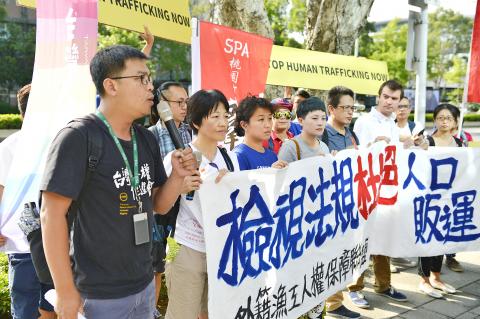Last month, Taiwan’s Immigration Agency hosted this year’s International Workshop on Strategies for Combating Human Trafficking. At the same time, Human Rights for Migrant Fishers staged a protest outside the workshop, calling attention to what they say is a lack of commitment on the government’s part when it comes to protecting migrant fishermen working in Taiwan’s deep sea fleet, a group considered vulnerable to trafficking and other forms of exploitation.
From the conference and protest, some new resolutions have come forth which may or may not spark change in what has been called a deeply flawed system by long-term observers and advocates for migrant worker rights.
FUNDAMENTAL FLAWS

Photo Courtesy of the Environmental Justice Foundation
According to a report issued in March by the Fisheries Agency, there are currently 19,000 migrant workers involved in Taiwan’s fishing industry. These workers predominantly hail from Southeast Asian nations such as the Philippines and Indonesia. However, according to a 2014 report issued by the US Department of State, that number could be as high as 160,000.
The reason for the discrepancy lies in illegal practices such as transfer of crewmen from vessel to vessel at sea. Such practices can lead to migrant fishermen falling through the cracks of a system that already sees them indebted to brokers who arrange their work overseas.
Once they fall through those cracks, says Lennon Wong (汪英達), director of the Serve the People Association, indebted workers who are financially abused or otherwise exploited have little recourse but to flee their employers, a virtual impossibility if they are at sea.

Illustration: Angela Chen
“The Fishery Agency allows brokers to charge migrant fishermen a fee before they start work — creating the ideal conditions for debt bondage,” he said at the conference. “In addition, many migrant workers’ identity documents are held by the brokers or employers. They are powerless.”
Allison Lee (李麗華), Yilan Migrant Fishermen Union secretary-general, says that although the US Trafficking in Persons Report gave Taiwan a tier 1 ranking, the highest there is, for the last nine years, it has also emphasized the human rights abuse in Taiwan’s distant water fisheries in every single year’s report.
“It shows that the problem has always been there, but the government only tries to cover it up instead of really dealing with it,” Lee said.
ONGOING PROBLEM
Taiwan International Workers Association secretary-general Chen Hsiu-lien (陳秀蓮) says current labor laws dealing with Taiwan’s long-distance migrant fishermen are inadequate for their protection.
“The current regulations cannot stop human rights abuses — in fact they might even drive them,” Chen said.
Chen says migrant workers are not allowed to freely change jobs because, legally, they must receive permission from their current employer or the government.
“Some employers use this to threaten workers,” Chen said.
The power employers wield over employees in Taiwan’s fishing fleet was yet again recently brought under the international spotlight. The International Labor Organization (ILO) reported in June that the first vessel to be seized for being in violation of the Work in Fishing Convention C188 — a series of measures of protection for the world’s 38 million workers in the fishing sector that came into force in November of 2017 — was a Taiwanese ship detained in South Africa.
Inspectors who boarded the ship found a slew of problems, including migrant fishermen with a lack of work documentation, insufficient food on board and poor health and safety conditions. According to a report of the incident released by the ILO, only two of the migrant fishermen had work agreements, there was no proper listing of the ship’s crew and the ship’s anchors were not operational.
In the end, the vessel was declared unseaworthy and the crew was evacuated. Only when sufficient repairs were conducted was the ship allowed to leave port again, with a fine of about US$895 levied against the vessel’s owner.
THE WAY FORWARD
Max Schmid, deputy director of the Environmental Justice Foundation, says there are a number of things the government can do to protect the rights of migrant fishermen.
“Our number one recommendation is bringing Taiwanese law in line with the international Convention C188, such as getting rid of salary deductions, which leads to debt bondage, and trying to remove the type of conditions that lead to forced labor,” Schmid says.
Schmid was also in attendance at the International Workshop on Combating Human Trafficking in Taipei. When the question of whether or not Taiwan would adopt Convention C188 was put forth at the workshop, the answer, he found, was less than forthcoming.
“They didn’t give an answer,” he said after the workshop’s final meeting at the end of last month. “Even in Thailand, with a fleet several times the size of Taiwan’s, they will bring 188 into law in September. If a country like Thailand, with all the challenges they face in regard to human rights can do that, Taiwan should be able as well.”
In spite of this apparent lack of concrete commitment to the health and safety of migrant fishermen on behalf of the Taiwanese government, a series of resolutions were reached at week’s end. Among them, government representatives agreed to review the recruitment process for migrant fishermen, and to review as well the differences between Convention C188 and Taiwan’s Labor Standards Act, which covers the vast majority of Taiwan’s workforce, but not fishermen working in the long distance fleet.
Overall, the stated goal coming out of the workshop is to bring NGOs into an increased role in the process involved in hiring and protecting Taiwan’s deep sea migrant fishermen, according to published final remarks, with a target of eventually bringing all migrant fishermen under the protection of the Labor Standards Act (勞動基準法). However, at this time, no timetable exists for the adoption of these new stated goals.
In the meantime, says Schmid, the federal government may do well to be aware that their action, or lack thereof, could have an effect on the local fishing industry’s bottom line.
“Increasingly retailers are aware there are risks in seafood in terms of human rights abuses,” Schmid says. “We’re seeing an increasing questioning in progressive retailers and buyers. I would hope Taiwan would see this as a chance to bridge the gap in their human rights record, as they are seen as a human rights leader in the region.”
With exports of the Taiwanese fishing industry valued as high as US$2 billion, if the gap continues to exist unchecked, it could become an expensive one, as retailers come to question what the human cost of their seafood really is.

In Taiwan there are two economies: the shiny high tech export economy epitomized by Taiwan Semiconductor Manufacturing Co (TSMC, 台積電) and its outsized effect on global supply chains, and the domestic economy, driven by construction and powered by flows of gravel, sand and government contracts. The latter supports the former: we can have an economy without TSMC, but we can’t have one without construction. The labor shortage has heavily impacted public construction in Taiwan. For example, the first phase of the MRT Wanda Line in Taipei, originally slated for next year, has been pushed back to 2027. The government

July 22 to July 28 The Love River’s (愛河) four-decade run as the host of Kaohsiung’s annual dragon boat races came to an abrupt end in 1971 — the once pristine waterway had become too polluted. The 1970 event was infamous for the putrid stench permeating the air, exacerbated by contestants splashing water and sludge onto the shore and even the onlookers. The relocation of the festivities officially marked the “death” of the river, whose condition had rapidly deteriorated during the previous decade. The myriad factories upstream were only partly to blame; as Kaohsiung’s population boomed in the 1960s, all household

Allegations of corruption against three heavyweight politicians from the three major parties are big in the news now. On Wednesday, prosecutors indicted Hsinchu County Commissioner Yang Wen-ke (楊文科) of the Chinese Nationalist Party (KMT), a judgment is expected this week in the case involving Hsinchu Mayor Ann Kao (高虹安) of the Taiwan People’s Party (TPP) and former deputy premier and Taoyuan Mayor Cheng Wen-tsan (鄭文燦) of the Democratic Progressive Party (DPP) is being held incommunicado in prison. Unlike the other two cases, Cheng’s case has generated considerable speculation, rumors, suspicions and conspiracy theories from both the pan-blue and pan-green camps.

Stepping inside Waley Art (水谷藝術) in Taipei’s historic Wanhua District (萬華區) one leaves the motorcycle growl and air-conditioner purr of the street and enters a very different sonic realm. Speakers hiss, machines whir and objects chime from all five floors of the shophouse-turned- contemporary art gallery (including the basement). “It’s a bit of a metaphor, the stacking of gallery floors is like the layering of sounds,” observes Australian conceptual artist Samuel Beilby, whose audio installation HZ & Machinic Paragenesis occupies the ground floor of the gallery space. He’s not wrong. Put ‘em in a Box (我們把它都裝在一個盒子裡), which runs until Aug. 18, invites